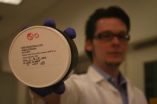(Press-News.org) DURHAM, N.C. – Researchers at Duke University Medical Center may finally have discovered why people with sickle cell disease get milder cases of malaria than individuals who have normal red blood cells.
In a finding that has eluded scientists for years, Duke researchers discovered that genetic material in red blood cells may help alter parasite activity via a novel mechanism that alters parasite gene regulation.
"One of the most interesting findings in our study is that the human microRNA (very small units of genetic material) found in sickle red cells directly participate in the gene regulation of malaria parasites," said Dr. Jen-Tsan Chi, M.D., Ph.D., senior author and associate professor in the Duke Institute for Genome Sciences and Policy and Department of Molecular Genetics and Microbiology. "These microRNAs enriched in the sickle red cells reduce the parasite's ability to propagate, so that certain people stay more protected."
MicroRNAs are small units of RNA, which come from DNA. MicroRNAs are only 20-25 nucleotides long and help to regulate gene expression.
The scientists also showed that when two different microRNAs were introduced at higher levels in normal red cells, the parasite growth also was decreased.
The findings appear in the journal Cell Host and Microbe.
"This finding should lead to greater understanding of the host-parasite interaction and parasite lifecycle, which may eventually develop into a new approach to therapy for malaria, which up to 500 million people develop each year worldwide," Chi said.
Every year about 1.5 to 3 million people die from the disease, most of them children, according to the World Health Organization (WHO). Between 1,000 and 2,000 cases occur in the United States.
"I think this work will expand our understanding of the interaction between the malaria parasite and its human host, given that this is a completely new mode of interaction between them, and will give us a far greater understanding of the parasite life cycle," said lead author Greg LaMonte, a scientist in the Chi laboratory.
The malaria parasites grow in the human red cells, cells that scientists thought lacked any genetic material. Many scientists had looked for the components in sickle cells that could help them resist the parasite, but the Duke researchers found one component by thinking outside of scientific norms.
The Duke team found microRNAs in the red blood cells and showed that their composition is dramatically different in the sickle red blood cells. Counter to what they expected, they showed that these differences directly contribute to the malaria resistance in sickle cell disease.
The scientists also conducted a different experiment that showed blocking these microRNAs (miR-451 and Let-7i is particular) in sickle cells reduced the ability of the cells to protect against malaria.
"If you block the miRNAs, the parasite grows two or three times as well," Chi said.
Another surprise in this investigation was the presence of a chimera, a fusion of human microRNA with the parasites' mRNAs.
"We never expected to find this," Chi said. "The fusion of human and parasite RNA represents a unique form of host-parasite interaction, and may reflect either a novel form of host-cell immunity or a mechanism by which the parasite is able to adapt to the host-cell environment."
###
Funding came from the Duke Chancellor's pilot project fund, the Roche Foundation for Anemia Research, Burroughs Welcome, Doris Duke Charitable Foundation and the National Institutes of Health (grant number NIH R21DK080994).
Other authors included Nisha Philip, Joseph Reardon, Nisha Philip, William Majoros and Lesley Chapman of the Duke Institute for Genome Sciences and Policy; all but Majoros are also part of the Duke Department of Molecular Genetics and Microbiology. Joshua R. Lacsina and Christopher V. Nicchitta are both with the Duke Departments of Cell Biology and Pathology. Courtney D. Thornburg is with the Duke Department of Pediatrics. Marilyn J. Telen is with the Duke Department of Medicine. Uwe Ohler is with the Duke departments of Biostatistics and Bioinformatics, Computer Science, and the IGSP. Timothy Haystead is with the Duke Department of Pharmacology and Cancer Biology. Co-lead author Nisha Philip, formerly of Duke IGSP, is currently at the Wellcome Trust Centre for Molecular Parasitology, University of Glasgow, Glasgow, Scotland.
END
Melting over the Greenland ice sheet shattered the seasonal record on August 8 – a full four weeks before the close of the melting season, reports Marco Tedesco, assistant professor of Earth and atmospheric sciences at The City College of New York.
The melting season in Greenland usually lasts from June – when the first puddles of meltwater appear – to early-September, when temperatures cool. This year, cumulative melting in the first week in August had already exceeded the record of 2010, taken over a full season, according to Professor Tedesco's ongoing analysis. ...
In our zest for cleanliness, have we permanently muddied our nation's waters?
A science team from Arizona State University, in collaboration with federal partners,
has completed the first statewide analysis of freshwater bodies in Minnesota, finding widespread evidence of the presence of active ingredients of personal care products in Minnesota lakes, streams and rivers.
These products are a billion dollar industry and can be found in antimicrobial soaps,
disinfectants, and sanitizers to scrub our hands and clean countertops. Hundreds of antimicrobial products are ...
New research from New Zealand's University of Otago is casting doubt on a landmark US study that suggested infants as young as six months old possess an innate moral compass that allows them to evaluate individuals as 'good' or 'bad'.
The 2007 study by Yale University researchers provided the first evidence that 6- and 10-month-old infants could assess individuals based on their behaviour towards others, showing a preference for those who helped rather than hindered another individual.
Based on a series of experiments, researchers in the Department of Psychology at ...
LOS ANGELES (Aug. 14, 2012) – An experimental immune-based therapy more than doubled median survival of patients diagnosed with the most aggressive malignant brain tumor, Cedars-Sinai Medical Center researchers reported in Cancer Immunology, Immunotherapy, published online Aug. 3.
Median survival in a Phase I clinical trial at Cedars-Sinai's Johnnie L. Cochran, Jr. Brain Tumor Center was 38.4 months, significantly longer than the typical 14.6-month survival of patients with newly diagnosed glioblastoma receiving standard therapy alone, which includes radiation and chemotherapy.
Median ...
Long-term methadone treatment can cause changes in the brain, according to recent studies from the Norwegian Institute of Public Health. The results show that treatment may affect the nerve cells in the brain. The studies follow on from previous studies where methadone was seen to affect cognitive functioning, such as learning and memory.
Since it is difficult to perform controlled studies of methadone patients and unethical to attempt in healthy volunteers, rats were used in the studies. Previous research has shown that methadone can affect cognitive functioning in ...
A sense of fairness is an important part of human behaviour, yet a research team involving Queen Mary, University of London (UK) found it did not evolve from our closest living relatives.
The study, published in the journal Biology Letters today (15 August) tested whether our great ape relatives, the chimpanzees and bonobos, have a sense of fairness like humans.
The scientists, involving Professor Keith Jensen, from Queen Mary's School of Biological and Chemical Sciences, put the apes through a series of ultimatum games.
One against the other, they had to choose ...
Philadelphia, PA, August 15, 2012 – Depression takes a substantial toll on brain health. Brain imaging and post-mortem studies provide evidence that the wealth of connections in the brain are reduced in individuals with depression, with the result of impaired functional connections between key brain centers involved in mood regulation. Glial cells are one of the cell types that appear to be particularly reduced when analyzing post-mortem brain tissue from people who had depression. Glial cells support the growth and function of nerve cells and their connections.
Over ...
Web shops, Cloud Computing, Online CRM systems: Each day many IT systems require the user to identify himself. Single Sign-On (SSO) systems were introduced to circumvent this problem, and to establish structured Identity Management (IDM) systems in industry: Here the user only has to identify once, all subsequent authentications are done automatically. However, SSO systems based on the industry standard SAML have huge vulnerabilities: Roughly 80 percent of these systems could be broken by the researchers from Ruhr-Universität Bochum.
Protection through digital signatures ...
One of the most sought-after goals in nuclear physics is an understanding of the structure of superheavy elements in the so-called "island of stability". These nuclei contain a large number of protons, and would ordinarily be ripped apart by the strong Coulomb repulsion between them. However, quantum mechanical shell-effects act to stabilize the nuclei, meaning that they can then live long enough to be observed in the laboratory.
In order to understand these "shell effects", detailed experimental studies are needed. Such studies are unfortunately precluded by the fact ...
Biomedical engineer Muhammet Uzuntarla from Bulent Ecevit University, Turkey, and his colleagues present a biologically accurate model of the underlying noise which is present in the nervous system. The article is about to be published in EPJ B¹. This work has implications for explaining how noise, modulated by unreliable synaptic transmission, induces a delay in the response of neurons to external stimuli as part of the neurons coding mechanism.
Neurons communicate by means of electrical pulses, called spikes, exchanged via synapses. The time it takes for brain cells ...


